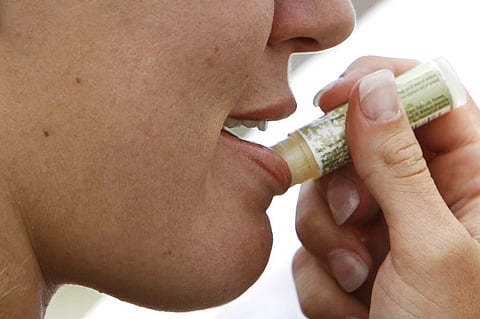
- LIFESTYLE
- FASHION
- FOOD
- ENTERTAINMENT
- EVENTS
- CULTURE
- VIDEOS
- WEB STORIES
- GALLERIES
- GADGETS
- CAR & BIKE
- SOCIETY
- TRAVEL
- NORTH EAST
- INDULGE CONNECT

When dry, cracked lips strike, many people instinctively reach for a tube of lip balm. But do these products actually heal and hydrate, or can they sometimes make things worse?
Dry lips can be a year-round problem, but they tend to be most common in winter. Cold temperatures, harsh winds, and indoor heating can strip moisture from the lips, leaving them flaky and irritated.
Lip balm can help create a protective barrier, keeping moisture locked in and shielding lips from environmental damage, said Dr Jenna Lester, a dermatologist at UCSF Health.
“That is a good barrier for the external forces,” she explained, especially against cold air and wind.
For most people, lip balm is an effective way to soothe and prevent chapped lips. However, not all lip balms are created equal. Some contain fragrances, flavouring agents, or preservatives that can actually cause irritation rather than relief.
“Those are the people who will say, ‘I tried these things. I thought my lips would get better, but they just keep getting worse and worse,’” said Dr Caroline Mann, a dermatologist at Washington University School of Medicine in St Louis.
Certain ingredients commonly found in lip balms can trigger irritation or allergic reactions, especially in people with sensitive skin. Some of the most problematic include:
Flavouring additives – These can cause irritation in some individuals, leading to redness and discomfort.
Lanolin – A waxy substance derived from sheep’s wool, lanolin is found in many moisturisers but can be a common allergen.
Formaldehyde – A preservative used in some cosmetics, formaldehyde can be irritating to the skin.
Oxybenzone – A chemical-based sunscreen ingredient, oxybenzone has been linked to allergic reactions in some people.
Allergic reactions to these ingredients can develop at any time, even if a product has been used without issue before. Once triggered, symptoms can persist for months.
Dermatologists recommend opting for fragrance-free, petroleum-based balms (often listed as petrolatum on labels) as a safer option for those with sensitive lips.
While lip balm can help, there are other effective ways to keep lips soft and hydrated.
Use a scarf for protection – Covering your lips with a scarf when outdoors can shield them from harsh winds and cold air.
Run a humidifier indoors – Indoor heating can create dry air, which worsens chapped lips. A humidifier adds moisture back into the environment.
Stay hydrated – Dehydration can lead to dry lips, so drinking enough water throughout the day is essential.
Avoid licking your lips – Although licking your lips might provide temporary relief, saliva evaporates quickly, taking even more moisture with it and making lips drier in the long run.
If your lips remain dry, cracked, or irritated despite using lip balm and following these hydration tips, it may be time to see a dermatologist. Persistent symptoms could indicate an allergic reaction, underlying skin condition, or deficiency that requires medical attention.
“If you do these things, you’ll get through the winter with soft, supple lips,” Mann said.
By choosing the right lip balm and incorporating healthy habits, you can keep your lips comfortable and hydrated no matter the season.